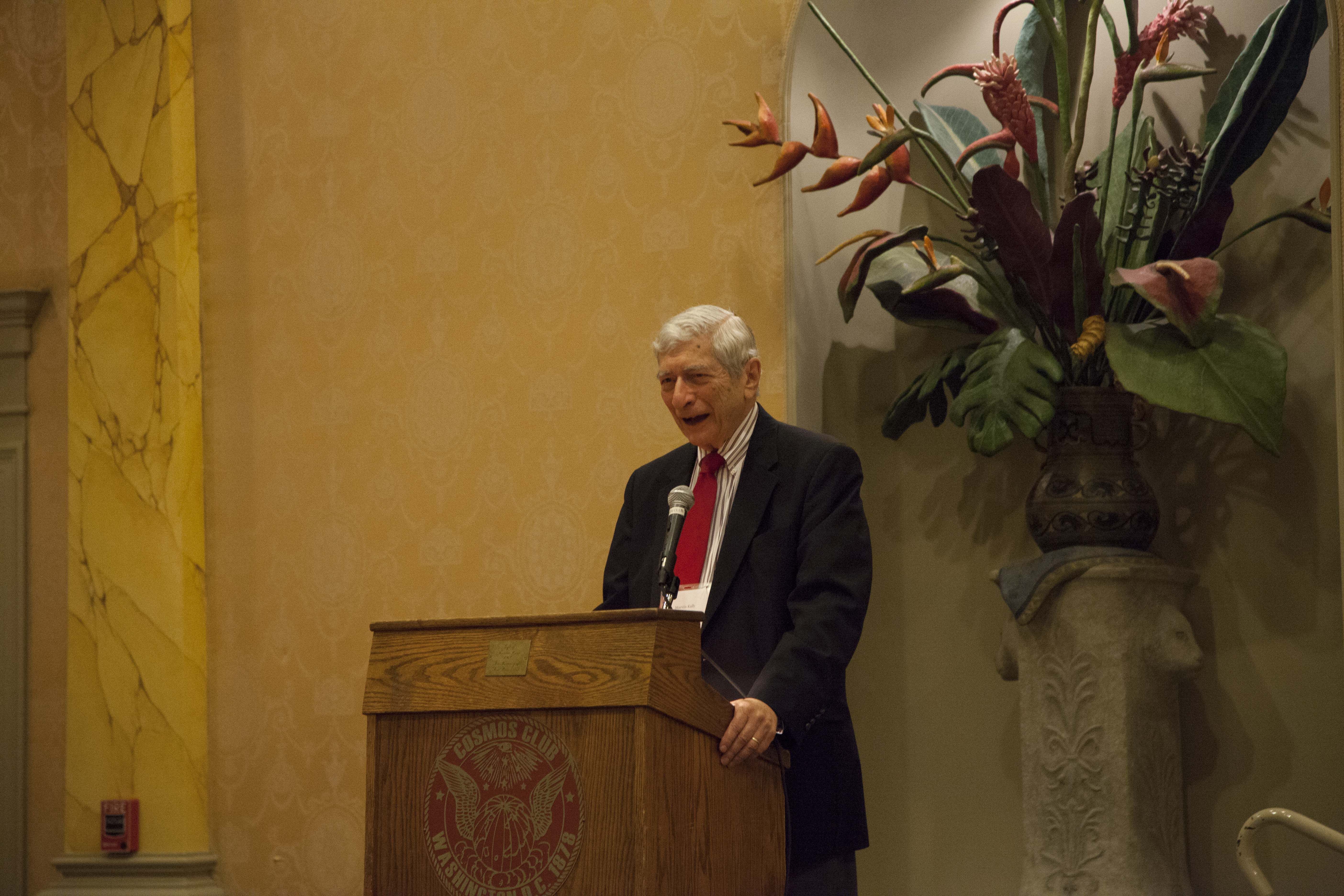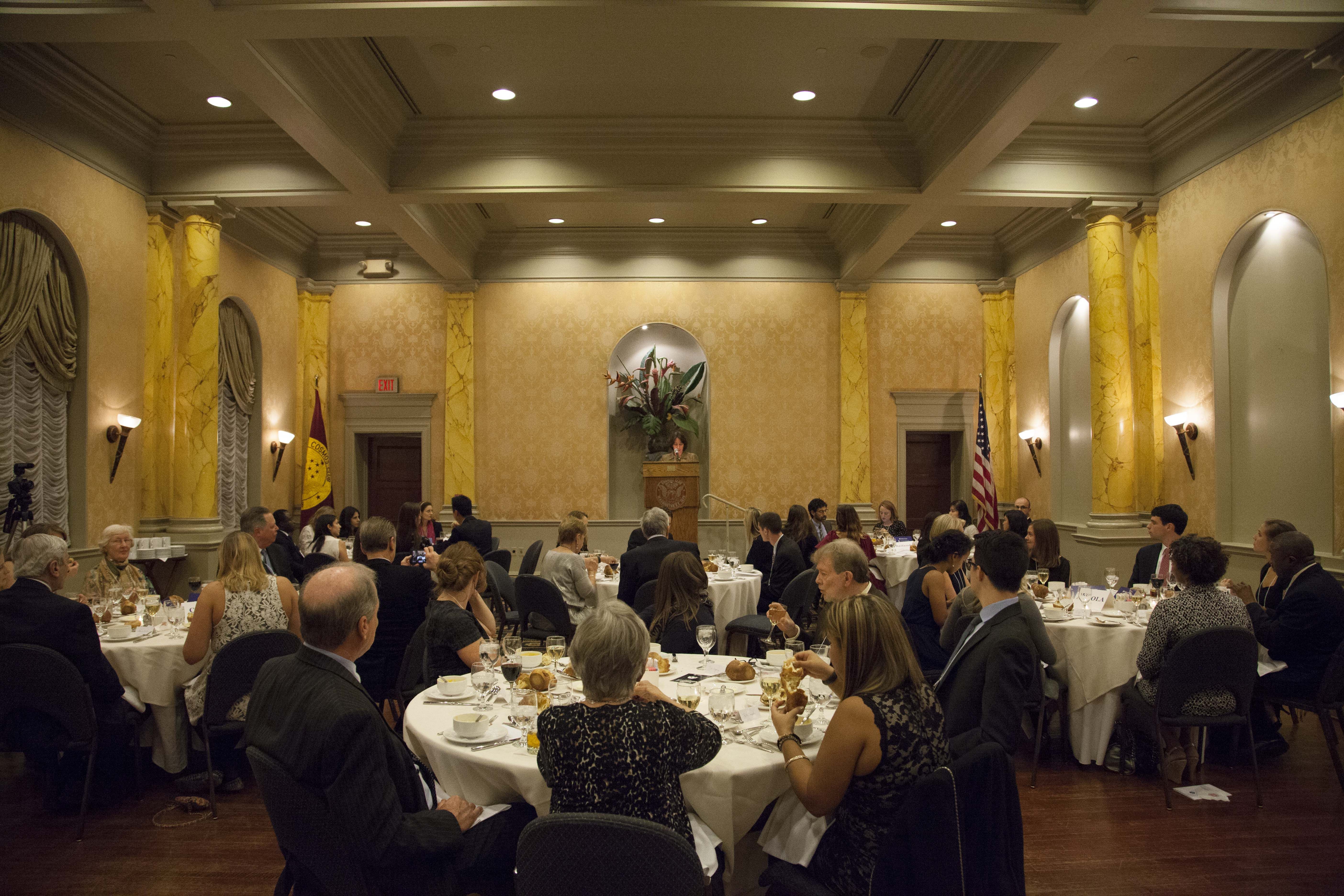The second Pulitzer Center Washington Weekend featured presentations by almost two dozen of our 2015 student fellows, on topics ranging from teenage pregnancy in the Dominican Republic to the presence of foreign multinationals in Angola. But these young journalists, many of them at the beginning of their careers, also heard from reporters with many years—in one case decades—of experience under their belts.
Istanbul-based journalist Emily Feldman, a Pulitzer Center grantee, reports on the humanitarian crises, especially those that affect women, resulting from conflicts in Iraq and Syria. She spoke to the group at the Friday evening dinner at Washington D.C.’s Cosmos Club, telling the fellows she was “completely impressed” by their work and emphasizing how important it is to be “on the ground, in the field” in today’s online world of aggregated news and social media.
“You can’t replace the sort of work you guys are doing,” Feldman said.
She explained that when she’d worked at NBC and the Benghazi story broke in 2012, she’d noticed that the datelines for all the stories were far away from Libya—Istanbul, Cairo, Beirut.
“It makes a difference when people who don’t have baggage or bias come to it and look at it with fresh eyes,” she said, adding that knowing the smell, mood, people and culture of a place made a journalist’s work much stronger. “I encourage you to continue doing it.”
After Feldman, Pulitzer Center senior advisor Marvin Kalb—just weeks after the publication of his fourteenth book—took the podium and regaled the crowd with anecdotes about his former boss, legendary journalist Edward R. Murrow, who was, according to Kalb, “the best in the business.”
“Everything he did had a point and an inner integrity,” Kalb said. “There was a clear search for truth. If you cannot get to the heart of the story, tell people. Murrow never wanted to go on the radio unless he was sure of something.”
Kalb cracked a joke about the Pulitzer Center weekly staff meetings, which he attends. “I haven’t a clue what they’re talking about,” he said. “They’re into the new technology. I listen as politely as I can and then grunt something which suggests antiquity.”
(Author’s note: Kalb is being modest; his presence lends a distinct degree of thoughtfulness, gravitas and perspective to these meetings.)
He explained that journalism is really an ancient craft. “The point is, there has always been journalism,” Kalb said. “It is the transmission of information. What a huge responsibility…to try to get it right.”
Kalb also echoed Feldman’s comments about the importance of being on the ground as a reporter.
“The core of the profession is to see things and smell things and talk to people and get as close to the truth as you feel you can be,” he said. “And then tell people about that.”
The following day, over lunch, New York Times White House correspondent Julie Hirschfeld Davis, a former intern of Pulitzer Center executive director Jon Sawyer, spoke to the students about her job and how she’d gotten there.
She told a story about the importance of doing your research as a reporter. As a young journalist, Davis had covered the National Spelling Bee. When one young competitor was eliminated, the AP reporter next to Davis said to him, “Well, kid, better luck next year.” The boy burst into tears and wouldn't talk to him. Davis, who’d done her homework and knew the boy was in his last year of eligibility, approached him in a more understanding way and therefore got better access.
She discussed the unique challenges of her job and offered the students tips for pursuing a career in journalism.
“You can find an interesting story anywhere,” Davis said. “You just have to be curious enough to look for it and persistent enough to tell it.”
She also emphasized the point Feldman and Kalb had made. “Be present,” Davis said. “I mean, physically there. Be wary of your own expectations and habits, because they can be the enemy of good reporting. Really cultivate your connections with people.
“You’re a journalist,” Davis added. “You’re where you are for a reason. It’s important that you get your story told.”









